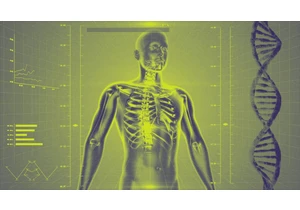Many of the biggest brands understandably stayed away from CES 2022. But there were still more than 2,000 exhibitors with an impressive array of technology on display. Like much of the press and analyst community, I initially canceled my plans to attend. But then I decided to go to Las Vegas anyway. I’ve been attending CES for nearly two decades, and this was the first time I had no hotel-suite meetings—and plenty of time (and space) to walk the show floor. These are a few of the best tech products I saw. Some demonstrate how the industry is evolving, and some are just fun. [Animation: Avi Greengart] A car that changes colors The most astonishing demo I saw was BMW’s iX Flow, a car completely wrapped in e-ink “paint” that can be changed on the fly between black, gray, or white designs. BMW justified the design by claiming that changing the color to white during the day can cool off the car, saving energy and adding range. But this is definitely more of a design gimmick than anything else, and I’m fine with that. Will BMW actually ship this? Not in its current form–if you look closely, the car’s e-ink skin is scratched in several places, and fit and finish is nowhere near BMW’s typical standards. Still, it’s very cool. BMW’s answer for quiet EVs
if(typeof(jQuery)=="function"){(function($){$.fn.fitVids=function(){}})(jQuery)};
jwplayer('jwplayer_6w3TXd3K_G2hQKLvX_div').setup(
{"playlist":"https:\/\/content.jwplatform.com\/feeds\/6w3TXd3K.json","ph":2}
);New electric cars are so quiet that automakers are now building in custom sounds to fill the silence. At BMW’s electric car and SUV pavilion, I entered a sound tunnel where I experienced a Batman-like score that Hans Zimmer created to give BMW’s quiet electric drivetrains some character. [Photo: courtesy of John Deere] John Deere’s self-driving tractor Everyone is talking about self-driving cars, but John Deere announced a fully autonomous tractor that you can buy today. Farmers face a shortage of workers and an extremely brief window to harvest crops and till the field before the weather changes. John Deere’s new 40,000-pound tractor drives itself, tilling the field using machine learning algorithms running on powerful Nvidia processors, along with GPS that’s accurate down to one inch. If the tractor notices an anomaly (like a fallen billboard, a flooded section of field, or a stray animal), it stops and sends a picture to the app on the farmer’s phone for further instruction. The farmer is freed up to focus on harvesting, business needs, or sleep–robot tractors can work around the clock. ‘Metaverse’ is mostly branding, for now The metaverse is coming! Augmented reality (AR) and virtual reality (VR) glasses and headsets are expected to be a main portal into that magical place, but most of the AR and VR I saw at this year’s show amounted to buzzwords and hype. A few promising developments stood out, however: Qualcomm announced that it is designing new silicon with Microsoft to power future AR glasses. This is not too surprising–Microsoft’s current HoloLens runs on Qualcomm’s PC platform alongside a Microsoft holographic processing unit (HPU)–but suggests that a new HoloLens will have better performance, and that it may be coming sooner rather than later. Sony Playstation VR2 Sony announced the name of its much-anticipated VR gaming device–it’s the “Playstation VR2″–but has released no images of the device and is still playing coy with the pricing and availability. Sony did, however, tease some content from its gaming studios: At a press event it showed a video (above) of Horizon: Call of the Mountain, a version of which will be released for Playstation VR2 in in mid-February. Sony has a clear vision for VR, and it starts with games you want to play from successful franchises.
Sony also provided some specification details, which suggest that the Playstation VR 2 will be relatively affordable–if you can find a PS5 console to drive it. [Photo: Avi Greengart] TCL’s AR glasses I got to try on a pair of TCL’s prototype AR glasses, which put the equivalent of a smartwatch in your field of view using full color dual waveguides. It’s based on Qualcomm’s Snapdragon 4100 chipset used in smartwatches, and is designed to be worn all day before recharging. It’s just a prototype, and the software and industrial design need work, but this definitely feels like the future. [Photo: Avi Greengart]Next generation display technology was everywhere at CES (except in LG’s booth, where the expected TVs were replaced by QR codes because the company pulled out of the show.) Samsung’s new stuff Samsung showed off an incredibly bright and sharp microLED TV in a more accessible 89″ size (though the price tag is likely to remain astronomical). The TVs, which use 25 million micrometer-sized LEDs that individually produce light and color, also come in 110-inch and 101-inch sizes. [Image: Samsung]Samsung showed off a new computer monitor called the Odyssey Ark (below), which is extremely curved for more immersive gaming, working, or both. Samsung also exhibited off various prototypes of tri-folding and rollable smartphones and tablets. [Photo: Avi Greengart]Sometimes you don’t need new tech, just better packaging: the 2022 versions of Samsung’s Frame televisions (below) have a matte finish that makes artwork look more like paintings on canvas. Interior designers are going to love it. [Photo: Avi Greengart] Webcams for the Zoom Age This was the first CES featuring many products that were designed after the pandemic started, and nowhere is that more apparent than in computers. In the past, PC vendors worked to minimize bezels at all costs, but all the new HP and Lenovo laptops at CES 2022 have slightly thicker top bars with better cameras and microphones, reflecting the fact that video conference calls are a bigger part of work life–whether or not we make it back to the office. [Photo: Ankerwork]Accessories brand Anker took the add-on webcam to its logical extreme: the $220 B600 Video bar combines a webcam, microphone, speaker system, and a light bar. [Photo: Avi Greengart] Lenovo ThinkBook Plus For people looking to get more work done on their laptop, Lenovo’s ThinkBook Plus has an extraordinarily wide screen, and adds a supplemental tablet-like screen to the right of the keyboard. [Photo: Avi Greengart] Planet Astro Slide Samsung, TCL, and others announced new smartphones this week, but none of them have a physical QWERTY keyboard for people mourning the death of BlackBerry. Planet Computers traces its heritage all the way back to Psion PDA days that predate BlackBerry, and its new Astro Slide is based on MediaTek’s Dimensity 800 chipset, making it the only 5G QWERTY smartphone in the world. [Photo: Avi Greengart] GAF Energy If you buy an electric car, you’re going to want to charge it, and if you own a home with a roof, adding solar panels is clearly the way to go. Except that you’ll need a custom installer, who may tell you you need a new roof first, into which support nails will be driven to anchor the panels. It’s enough to make you think twice about installing panels. GAF Energy used CES to launch a clever solution: solar panels made out of roofing material that any roofer can install–no electrical experience necessary. Then GAF sends a technician to connect the wiring. The GAF Energy solar panels are roughly the same price and efficiency as regular solar panels and traditional shingles. [Animation: Avi Greengart] Tattoo you Part of the fun of CES is, and always has been, the gadgets, and I found one that was capable of (temporarily) tattooing my company’s logo on my arm. I couldn’t resist. The Prinker uses skin-safe ink that remains vibrant throughout the day but can be washed off quickly with just a bit of soap and water. Is this a world-changing product? No. But it will be a big hit at parties once those are a thing again. Avi Greengart is President and Lead Analyst for Techsponential, a technology market advisory firm. You can reach him at avi@techsponential.com.
Autentifică-te pentru a adăuga comentarii
Alte posturi din acest grup

Apple, which has built its brand on data privacy, settled a class action suit this week in w

If Spotify Wrapped left you underwhelmed this year, TikTok’s “Dating Wrapped” trend is here to sp

Dating apps are gearing up for their busiest day of the year: Dating Sunday.
This landmark day in the dating world always lands on the first Sunday of January. The idea is that sin

A federal appeals court sealed the fate of the Biden administration’s efforts to regulate internet providers on Thursday, st

The new year started out with the worst kind of bang. In the early hours of January 1,

All the excitement around artificial intelligence can make it hard to notice all the other exciting progress lately that’s been the result of human intelligence.
Of course, it’s getting

When taking a trip down memory lane, some might flip through a photo album or scroll through their phone’s camera roll. But would you think to check Google Maps?
Since 2007, Google’s Str
